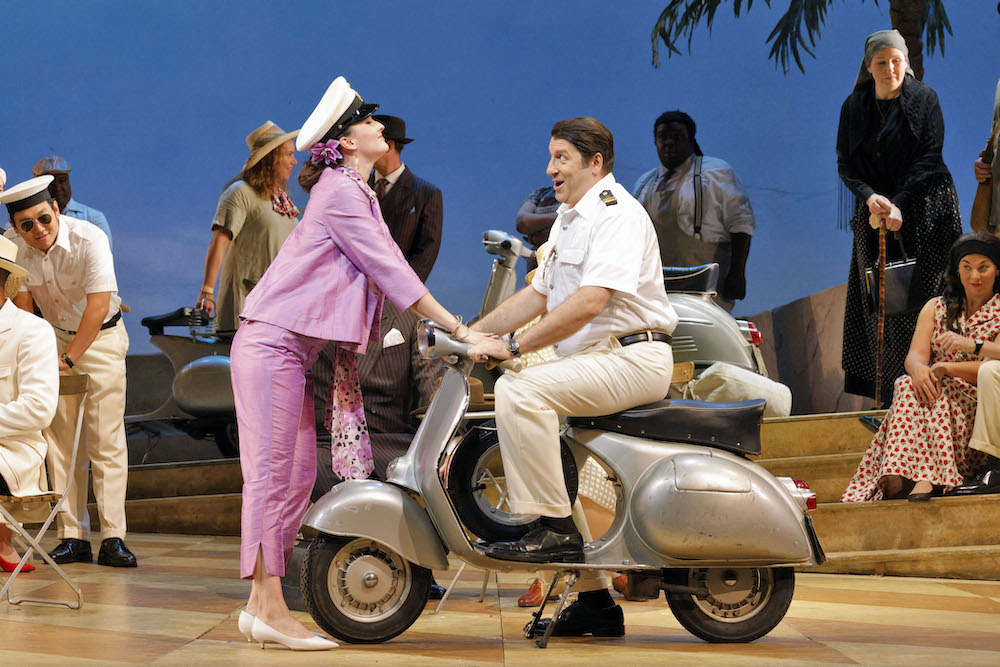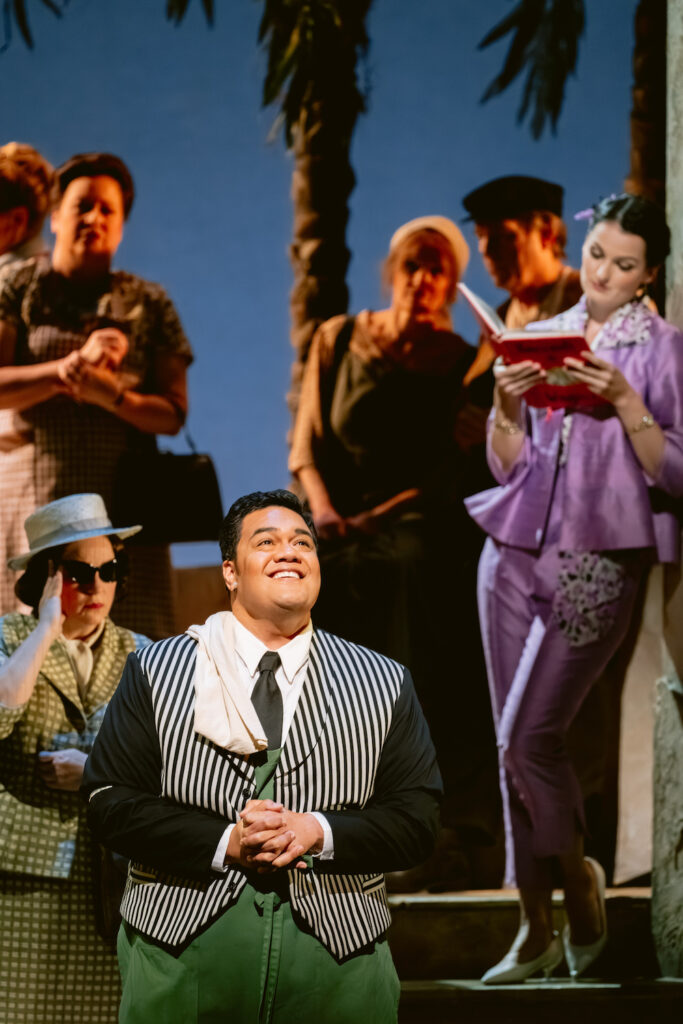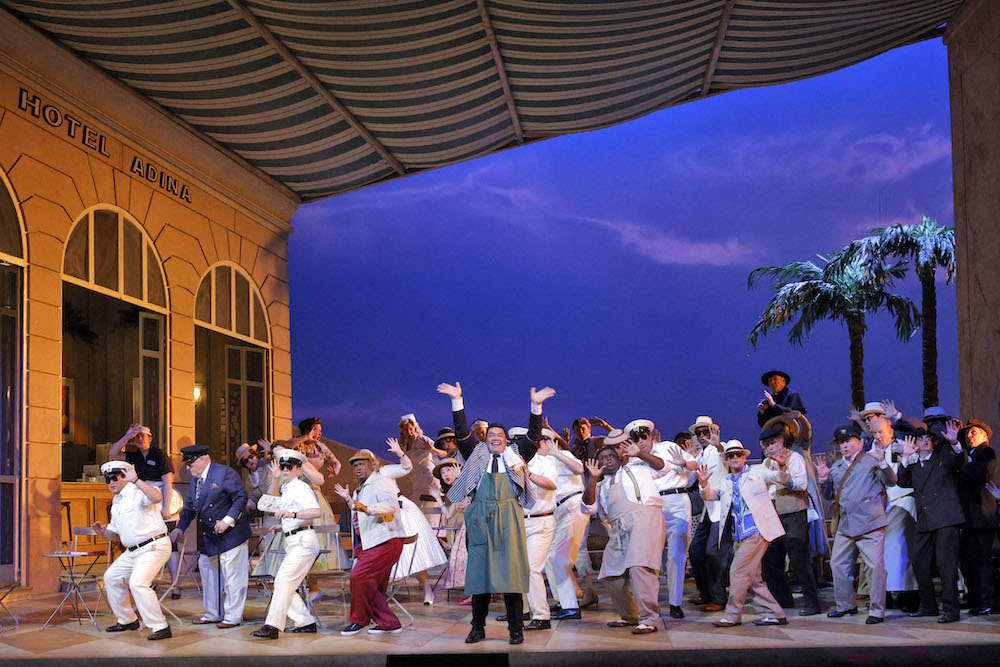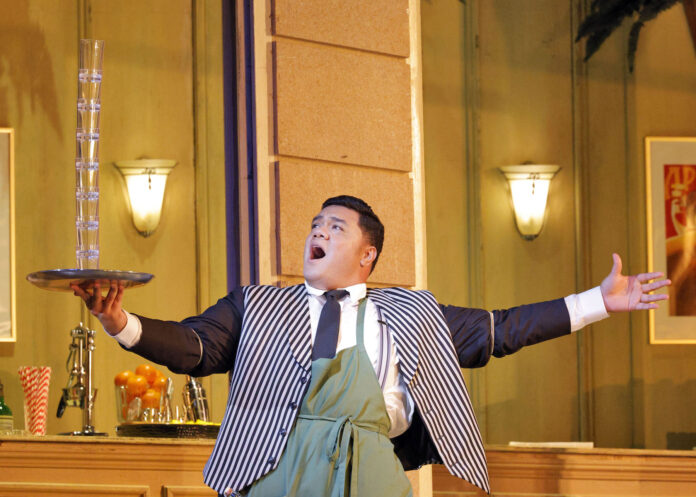As we come to the midpoint of SF Opera’s 101st season, I find myself wondering how much of its revivals are done for the sake of looking at a controversial classic through modern eyes, or if the Opera just holds those polemic shows in the same esteem as it did in prior eras? I can definitely see some progression in the productions of Madame Butterfly and Il Trovatore, but not enough to erase the problematic elements that still exist in both operas.
Whatever the intention, the Opera certainly had its work cut out for its team in reviving Gaetano Donizetti’s The Elixir of Love (aka L’elisir d’amore, through December 9 at the War Memorial Opera House). It’s an old-fashioned “nice guy” story featuring the wince-inducing plot point of using a “love potion” (though on oneself rather than the object of your affection, but still) to win someone’s affection. Hell, the plot is set into motion due to an explicit affinity for Tristan & Isolde, a problematic classic in its own right.

In a way, Elixir is a lot like an ‘80s rom-com in how both its timeless and poorly-aged elements are played entirely for whimsy. Though the action was moved from Donizetti’s inspiration of Basque, Spain to the Italian Riviera of the late-‘50s/early-‘60s (marketing materials note an influence of Fellini’s La Dolce Vita), the story—which Donizetti and librettist Felice Romani based on Daniel Auber and Eugène Scribe’s Le Philtre—finds Nemorino (Samoan tenor Pene Pati) working as a waiter at the seaside Hotel Adina. He’s smitten with the establishment’s namesake owner (Slovakian soprano Slávka Zámečníková), who sees Nemorino as nothing more that a platonic friend. It doesn’t help our dear waiter that Adina is now being courted by decorated officer Sergeant Belcore (French baritone David Bižić), of whom Nemorino is not fond.
Things take a turn for the unexpected when the small seaside village is visited—via air balloon, no less—by snake-oil “Doctor” Dulcamara (Italian baritone Renato Girolami) shilling his bottled “miracle” potion. The tonic promises to make whomever drinks it irresistible to the person to whom they’re attracted. Nemorino, inspired by Adina’s known affinity for the story of Tristan & Isolde, buys a bottle. It may not have any supernatural powers, but it certainly gives Nemorino a new swagger; so much so that he does indeed catch the attention of Adina, who doesn’t seem to like the change in their relationship dynamic. No matter what she really feels for the lovestruck waiter, Adina accepts Belcore’s marriage proposal just to make Nemorino jealous. Can he get her to change her mind before the potion’s time is up?

If there is one indisputable shining star in this production, it’s Pene Pati. All of the performers have great stage presence and are excellent vocalists, but Pati steals the show with just how much he’s clearly enjoying himself. The “nice guy” trope can’t die soon enough, but Pati’s Nemorino is the lovable underdog you want to see succeed in his Sisyphean task of rolling a boulder up a hill. He has great comedic timing, especially when insulting Belcore just out of earshot. Yet, the highlight has to be when he gets his potion-inspired swagger, and begins peacocking to a truly absurd level, including some really goofy dancing with finger-pointing. It’s a great reminder of how even opera—one of the “stuffiest” of classic art forms—can be intentionally silly when it wants to.
I also really got a kick out of Robert Innes Hopkins’ set for the outdoor courtyard of the Hotel Adina. It’s at such an odd angle, connecting at upstage-right, that it looks like an optical illusion, like that of the old Exploratorium room that make you look tall if you stand at one end and short if you stand at the other end. And I don’t know who made the prop of Dulcamara’s balloon as seen from a distance, but it was hilarious to look at, and I’m really hoping that was intentional. It looked like something that would fly over the neighborhood model at the start of Mister Rogers’ Neighborhood. Given how ridiculous both Dulcamara and his claims are, it would actually be appropriate for him to enter on an hilarious-looking prop (the larger balloon piece looks just fine).

Having viewed this as a livestream, there were no CO² readings for me to take on hand. Yet, I was once again pleasantly surprised to see a mask worn on stage by a member of the chorus.
It may seem odd, but I found myself thinking of John Hughes’ comedies as I watched this livestream. Perhaps it’s because the protagonist is a lovelorn little guy, maybe it was the way all these characters could be high school archetypes without changing their motivations, or maybe it was just the fact that I was an ‘80s kid and John Hughes flicks creep into my mind on a regular basis. Still, I found myself thinking of how Hughes muse Molly Ringwald has taken to looking back at their collaborations with a more skeptical eye, now much more conscious of the sexist clichés and unhealthy actions that are just creepy in hindsight. She also still recalls the good time she had making them, the effect they had on countless teens who saw themselves in the characters, and the fact that most of the humor and pathos still work perfectly.
Help us save local journalism!
Every tax-deductible donation helps us grow to cover the issues that mean the most to our community. Become a 48 Hills Hero and support the only daily progressive news source in the Bay Area.
The Elixir of Love was conceived as a light romantic comedy meant to put its audience at ease. Striking design choices and some pitch-perfect performances show that there’s still a great deal of fun to be had with the material. The setting jump to 1960s Riviera doesn’t do much to change the story, but it does emphasize how much the opera is a product of its original time. I don’t know if that was SF Opera’s intention, but it does show why the story can still entertain.
THE ELIXIR OF LOVE runs through December 9. War Memorial Opera House, SF. Tickets and more information here.





